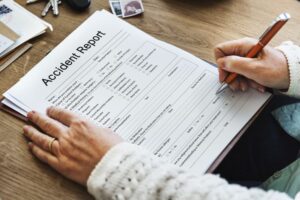Suffering injuries in a Denver car accident can be a distressing and overwhelming experience. The complex legalities and procedures may leave you confused and unsure about what actions to take next. In such situations, you want the guidance and support of a qualified car accident lawyer by your side. With their help, you can navigate the personal injury claims process and protect your rights throughout.
If you’ve been in an accident, reach out to an experienced car accident attorney in Denver to schedule a free consultation.
Why Report an Accident?
Before diving into the details of how to report an accident in Denver, it’s essential to understand why you should report an accident in the first place. Reporting an accident serves several purposes, including:
- Legal Requirement: In Denver, as in most jurisdictions, reporting an accident is a legal requirement. Colorado law mandates that all accidents involving injury, death, or property damage above a certain amount must be reported to the appropriate authorities.
- Claims and Insurance: Reporting an accident is essential for initiating insurance claims both for your own insurance policy and any involved third parties. Filing a report ensures that you have a formally documented record of the incident, which can be crucial when dealing with insurance companies.
- Evidence Preservation: Reporting an accident promptly helps preserve critical evidence from the scene. This includes pictures, witness statements, and any other relevant information that can support your case if a legal dispute or claim is necessary.
Steps to Report an Accident in Denver
It’s also important to understand the process of reporting an accident in Denver:

Step 1: Contact Law Enforcement
In Denver, you must contact the local police or Colorado State Patrol if the crash involves injury, death, or significant property damage. The local authorities will document the details of the accident and draft an official accident report. This report will serve as an essential piece of evidence for insurance claims and any potential legal proceedings. Having this report can be invaluable to maximizing your injury compensation.
When giving your account of the accident, be sure you are honest and detailed, but don’t speculate or add details you can’t remember or don’t know.
If the road or weather conditions are exceptionally poor, the City and County of Denver sometimes go on “accident alert.” If this occurs, and no one suffers an injury or dies, you should exchange information with the other driver(s) (see below) and report the accident online.
Step 2: Exchange Information
Always exchange and share information with the other parties involved in the accident. This typically includes:
- The complete names and contact information (phone number, address) of all parties involved, including passengers
- Driver’s license numbers
- Insurance information (insurance company name and policy number)
- Vehicle registration details (license plate number, make, and model of vehicles involved)
- Any eyewitness accounts and contact information, if available
If your injuries prevented you from getting this information at the scene of the accident, it should be in the police report, and your attorney can obtain it later.
Step 3: Consult with a Denver Car Accident Attorney
After reporting the accident to your insurance company, consulting with a Denver car accident attorney is in your best interest. By getting legal representation early on, you can stand up for your rights and receive guidance on the next steps to take. An experienced car accident lawyer can navigate complex legal procedures and negotiate with insurance carriers and their attorneys, ensuring you receive fair compensation for your injuries and damages.
Step 4: Report the Accident to Your Own Insurance Company
You must notify your insurer about the accident as soon as possible, and you should have your lawyer handle this. An attorney can provide them with all the relevant details, including the accident report number, if available. A prompt report of the accident to your insurance company helps initiate the claims process and a timely investigation of your case.
What is the Statute of Limitations?
In Colorado, the statute of limitations (SOL) for car accidents establishes a specific timeframe for individuals to file a legal claim after sustaining injuries in a car accident. The SOL is a legal deadline, and failure to file your lawsuit within that timeframe may result in the loss of the right to pursue compensation.
In Colorado, the general statute of limitations for personal injury claims, including those arising from car accidents, is two years from the date of the accident. This means injured parties have a two-year period to file a lawsuit against the at-fault party or parties. If a lawsuit is not filed within this period, the court may dismiss the case, barring the injured individual from seeking compensation.
Individuals involved in car accidents must be aware of this time restriction and take prompt action to protect their legal rights. Initiating legal proceedings within the legal timeframe is essential for preserving the opportunity to seek compensation for medical expenses, property damage, lost income, and other damages resulting from the car accident. Consulting with a Denver car accident attorney in a timely manner can provide valuable guidance on navigating the legal process and meeting crucial deadlines to ensure the best possible outcome for the injured party.
Potential Denver Car Accident Injuries
Car accidents can cause many different injuries, varying in severity based on the impact, vehicle speed, safety measures in place, and other factors. Understanding potential car accident injuries is essential for both drivers and passengers to seek prompt medical attention and legal recourse.

- Whiplash: Whiplash is quite common and happens when the skull suddenly jerks forward and backward in an accident. This rapid motion strains the neck muscles and ligaments, causing pain, stiffness, and headaches. While whiplash is common in rear-end collisions, it can happen in various accident scenarios.
- Fractures and Broken Bones: The force of a car accident impact can lead to fractures and broken bones. These injuries are prevalent in high-impact collisions or accidents where the occupants get thrown against hard surfaces. Fractures may affect limbs, ribs, or the skull, requiring immediate medical attention.
- Head Injuries: These injuries can range from mild concussions to severe traumatic brain injuries (TBIs). Even with airbags and seatbelts, the head can still be susceptible to impact during a car accident. Symptoms may include dizziness, confusion, nausea, and, in severe cases, cognitive impairment.
- Back Injuries: The jarring motion of a car crash can cause back injuries, such as herniated discs or spinal cord injuries. These injuries may lead to chronic pain, limited mobility, or, in severe cases, paralysis.
- Soft Tissue Injuries: Muscles, tendons, and ligaments can suffer damage in a car accident, resulting in soft tissue injuries. It’s quite common for soft tissue injuries to not be immediately apparent, but they can cause lingering pain, inflammation, or restricted movement over time.
- Internal Injuries: In addition, the force of an impact can cause severe or even fatal damage to internal organs, such as the spleen, liver, or lungs. Internal injuries may not always manifest externally, making them potentially life-threatening if not promptly diagnosed and treated.
- Cuts and Lacerations: Broken glass, sharp metal edges, or loose objects in the vehicle can cause cuts and lacerations during a car accident. While these injuries are generally treatable, they may still require stitches, and there’s a risk of infection.
- Emotional and Psychological Injuries: Car accidents can have lasting emotional and psychological effects, leading to conditions like post-traumatic stress disorder (PTSD), anxiety, or depression. Witnessing or experiencing a traumatic event on the road can impact mental well-being long after the physical injuries have healed.
- Knee Injuries: Knees might collide with the dashboard or other hard surfaces due to the crash’s impact, causing injuries such as dislocations, fractures, or damage to ligaments and cartilage.
- Facial Injuries: Airbag deployment, shattered glass, or direct impact can lead to facial injuries, including fractures, contusions, or dental damage. Facial injuries may require immediate medical attention and, in some cases, reconstructive surgery.
Seeking medical attention right after a car accident is crucial, even if injuries seem minor initially. Some injuries may have delayed symptoms, and early diagnosis and treatment can significantly impact recovery. Additionally, documenting injuries is essential for legal purposes, especially if pursuing a personal injury claim to pay for medical expenses and other damages resulting from the accident.
Damages in a Car Accident Claim
Car accidents can result in various types of damages, including both physical harm and financial losses. Understanding the different categories of damages is crucial for individuals involved in accidents to seek appropriate compensation for their losses. In legal terms, damages refer to the financial compensation awarded to the injured party to cover losses resulting from the car accident.

- Medical Expenses: Medical expenses are among the most expensive categories of damages in a car accident. The costs associated with emergency medical treatment, hospitalization, surgery, medications, rehabilitation, and ongoing medical care are all included under this umbrella. Individuals injured in car accidents may incur substantial medical bills, and seeking compensation for these expenses is essential.
- Property Damage: Car accidents often result in damage to vehicles involved. The costs associated with repairing or replacing damaged vehicles fall under property damage. This includes repairs to the vehicle’s body, engine, and any other components. Property damage claims can also cover personal property within the vehicle, such as laptops, phones, jewelry, clothing, shoes, or other valuables damaged in the accident.
- Lost Income: If injuries from a car accident prevent individuals from working, they may be entitled to compensation for lost income. This includes income lost during the recovery period and any potential future income lost due to long-term disabilities or impairments caused by the accident.
- Pain and Suffering: Pain and suffering are non-economic damages that compensate individuals for the physical and emotional distress they experienced from the car accident. This can include the physical pain experienced due to injuries, emotional anguish, loss of enjoyment of life, and mental health issues arising from the trauma of the accident.
- Emotional Distress: Emotional damages can be awarded separately from pain and suffering and compensate for the psychological impact of the accident. This can include anxiety, depression, post-traumatic stress disorder (PTSD), or any other emotional issues resulting from the traumatic event.
- Loss of Consortium: Loss of consortium damages may be applicable if a car accident leads to severe injuries that impact personal relationships. These damages compensate for the loss of companionship, support, and intimacy suffered by the injured party’s spouse or family members.
- Punitive Damages: In certain situations where the at-fault party’s actions were particularly egregious, punitive damages may apply. Punitive damages punish the wrongdoer and deter others from engaging in similar conduct. However, punitive damages are not awarded in every case and typically require a showing of extreme negligence or intentional misconduct. They are only available in cases that go to trial.
Understanding the full extent of damages resulting from a car accident is key for individuals seeking fair compensation. Consulting with a qualified Denver car accident attorney can help navigate the ins and outs of the legal process, assess the damages incurred, and pursue a comprehensive claim to cover all losses resulting from the accident.
Contact a Denver Car Accident Attorney Today
Reporting an accident in Denver is a critical step in protecting your rights and obtaining the full and fair compensation you deserve. By following the steps outlined in this guide and seeking the assistance of a knowledgeable Denver car accident lawyer, you can navigate through the process with confidence. Contact an attorney today for a free consultation, and let them fight for your rights.
One of the reassuring aspects of consulting with a car accident attorney is that most firms offer free initial consultations. This allows you to meet with an attorney without any financial risk or obligation. During this consultation, you will have the opportunity to discuss the details of your case and ask any questions you may have. The attorney will listen to your story, evaluate the potential for a successful claim, and provide valuable insights into the legal process.
By taking advantage of this free consultation, you can gain a better understanding of your rights and options. Call Denver personal injury lawyers today.




















